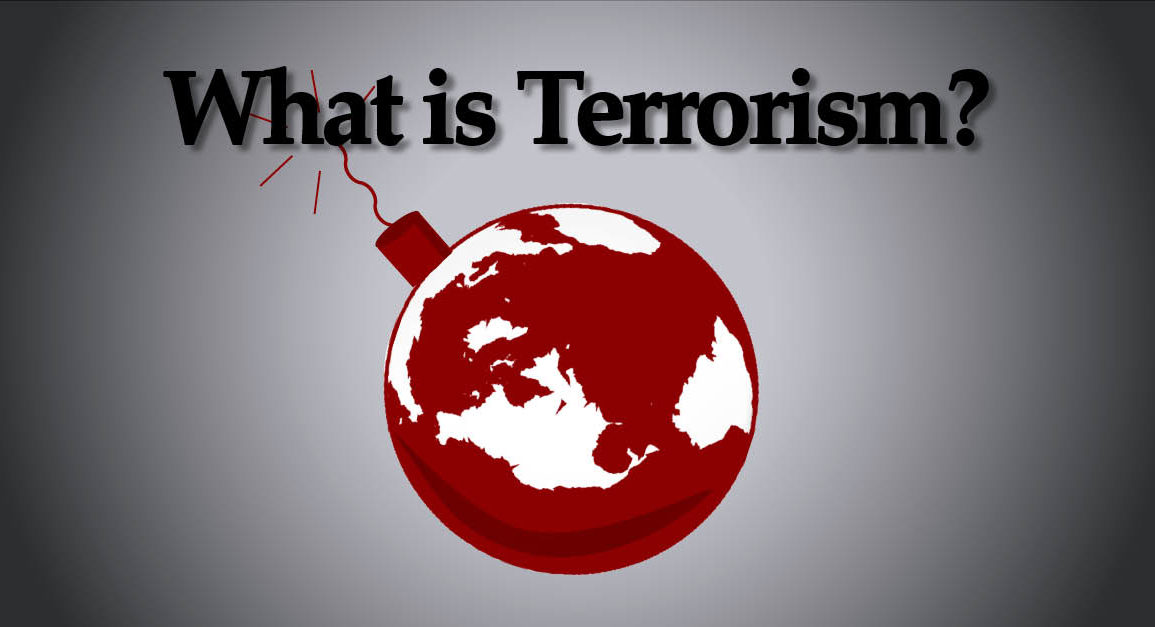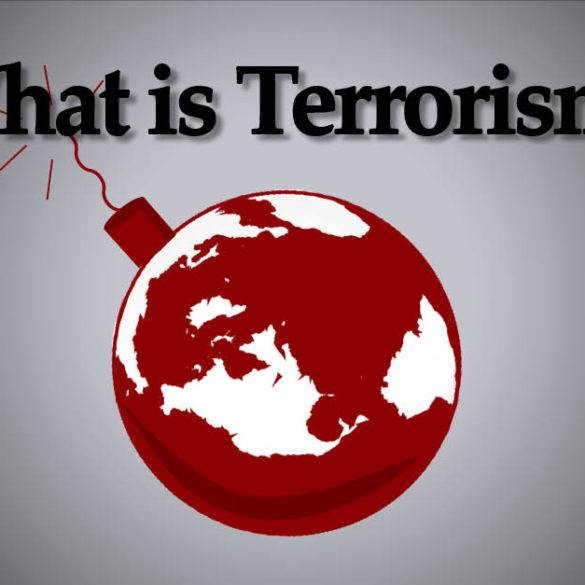Since 9/11, terrorism has continued to strike fear in the hearts of contemporary Americans. But even experts cannot agree on its definition.
When most Americans hear the word terrorism, many picture the Twin Towers crumbling to the ground. But when it comes to other violent incidents, such as the Boston Marathon bombing in 2013 or the Orlando nightclub shooting in 2016, experts debate whether or not these are acts of terrorism.
Some experts argue that only physical acts of violence qualify as terrorism, while others say terrorism includes verbal threats. Some dispute whether destroying property is terrorism, or if only physical injury to people is classified as such. Others debate whether Americans who commit violence on U.S. soil can be considered terrorists.
According to a 2013 study by Pew Research Center, 75 percent of Americans say occasional acts of terrorism will be part of U.S. life in the future.
To get a better understanding of the definition of terrorism, Ball Bearings sat down with Bob White, Donna Schlagheck, David Carlson, and Jeff Gruenewald to discuss their definitions of the term. After the initial interviews, each looked over and reflected on the other responses.
 Bob White is the sociology department chair at Indiana University-Purdue University Indianapolis. His academic interests include political sociology and state terrorism.
Bob White is the sociology department chair at Indiana University-Purdue University Indianapolis. His academic interests include political sociology and state terrorism.
Well, this is where it gets tricky. I don’t like the word terrorism and would prefer using the words political violence” because terrorism as a concept has become so politicized that it can’t be used properly.
But there are good definitions of terrorism out there. Paul Wilkinson, one of the foremost researchers of terrorism in the UK, came up with a really good one, which was something like the use or threat of coercion to intimidate people or governments into doing things.
But then Wilkinson turns around and applies that definition only to insurgents, like the Irish Republican Army. Last I checked, governments also try to coerce people by threatening and using physical force. There’s scholarship out there where the authors will refer to “Palestinian terrorism” and “Israeli repression,” even though both places face similar violence.
My view is that all similar activity either should or shouldn’t be classified as terrorism. The definitions shouldn’t vary if the act is the same.
So I just don’t like the term. I would rather side with Charles Tilly, who was a very noted scholar of sociology. I agree with him that we should use the term “political violence,” which is the threat of or use of physical force to achieve political ends.
 Donna Schlagheck is a professor emeritus and former department chair of political science at Wright State University. Her specialities include terrorism, American politics, and world affairs.
Donna Schlagheck is a professor emeritus and former department chair of political science at Wright State University. Her specialities include terrorism, American politics, and world affairs.
Terrorism is the threat or use of violence against a symbolic target, designed to exploit the media, for the ultimate objective of affecting policy.
Terrorism can include blowing up an embassy, blowing up or hijacking an air carrier, killing or abducting an American citizen—those sorts of acts of violence.
I think it’s very important that when we talk about changing policy, we recognize that we often modify our definition of terrorism in order to flag people whose goals we disagree with. And yet, we will write it in such a way that if parties we agree with are using it, then they’re okay.
 David Carlson is a religious studies and philosophy professor at Franklin College. He is a frequent speaker on the topic of religious violence.
David Carlson is a religious studies and philosophy professor at Franklin College. He is a frequent speaker on the topic of religious violence.
I see terrorism as the deliberate use of fear and violence against civilian populations and minority groups in order to intimidate, demoralize, and make those groups feel vulnerable.
I think that’s what distinguishes terrorism from, let’s say, violence between combatants in a war. Terrorism is against the civilian population or a smaller group that is not a trained, equipped combatant. They just happen to be the deliberate targets.
It’s one thing when we read that U.S. soldiers in Afghanistan have been attacked by the Taliban. It’s something completely different when we read that someone went into a community center in San Bernardino and just began to indiscriminately kill. If I have a relative in the military, the first story obviously concerns me. But terrorism means that everyone is potentially in harm’s way.
I think people often ignore that those who commit what are seen as offensive terror attacks probably see themselves as on the defensive. Terrorists generally believe that they are responding to some atrocity or humiliation that, let’s say, a government has done against their country or group.
The classic case is 9/11. After 9/11, President Bush said Al Qaeda attacked because they were jealous of our freedoms and democracy. But Al Qaeda’s website at that time listed three reasons for 9/11. One was that the United States military was still in Saudi Arabia after the first Gulf War. Because Al Qaeda considered Saudi Arabia a holy land, the presence of American troops insulted them. They were also motivated by U.S. sanctions against Iraq that had led to the deaths of about 50,000 children. The final reason they gave was the treatment of Palestinians by U.S. foreign policy.
Those are, in my opinion, obviously not valid reasons for terrorism. But they believed they were responding to what they would call a “state-sponsored terrorism.” They did not see themselves as initiating or attacking.
 Jeff Gruenewald is an assistant professor at the School of Public and Environment Affairs at Indiana University-Purdue University Indianapolis. His areas of expertise include terrorism and extremism as well as homeland security policy.
Jeff Gruenewald is an assistant professor at the School of Public and Environment Affairs at Indiana University-Purdue University Indianapolis. His areas of expertise include terrorism and extremism as well as homeland security policy.
Terrorism is a criminal act, motivated in part or wholly by political or social reasons. It would include the most extreme, serious, and fatal crimes, but also property crimes like cross burnings or other types of intimidation. So, for me, it doesn’t have to be violent.
Anyone, any type of person from any background, could be labeled a terrorist if they are found guilty of committing that particular criminal act.
Based on past conversations, I think I differ from others in my belief that the social and political objectives can be intended or not. I think I’m a little more inclusive: People can make political or social statements with their crimes, even if they don’t intend to.
Reflections
Bob White
I like [Donna’s] definition, but I would argue that something is missing when she talks about bombing an embassy and kidnapping an American. It doesn’t have to be an American, right? It could be anybody in the world. Also, what about when the United States bombed the hell out of Baghdad? Wasn’t that a political statement? Governments [commit terrorism] too.
There are parts of [David’s answer] that I like. I don’t know that much about the Taliban, but I would have considered them the government of Iraq, and they would have had an army. We have to recognize that the U.S. Army and the soldiers in our army can commit terroristic acts. A government, an army, or an individual [can commit political violence].
I have a problem with [Jeff] defining it as a criminal act. During World War II, for example, Churchill and his war cabinet sought out German cities with narrow streets, which would make it hard for the firefighters to respond to a bomb. In other words, they intentionally sought to inflict civilian casualties, right? A lot of people might think that in a time of war, that’s okay. But to me, that’s a criminal act.
Some of the stuff that the Ku Klux Klan engaged in might not have been illegal, but it was certainly terroristic. But the [same] powers that [establish laws] tend to define terrorism. I would agree [with Jeff] that violence does not have to be part of it, and I think it’s why the notion of coercion and threat and intimidation are typically part of most definitions.
Donna Schlagheck
I understand [Bob’s] reaction. The term has been politicized. But if the goal is a political objective, I think the political objective has to be at least as important as the method of violence.
[In response to David’s answer], I disagree that only innocent civilians can be the target. Governments themselves have been targets of terrorism. So, I think [David’s] is a highly politicized, contortionistic definition.
I find [Jeff’s answer] very bizarre. Terrorism tends to be carefully thought out, [but he is labeling as terrorism] all sorts of threats of violence to persons or property if they have political objectives. I find it rather bizarre that it might not be intentional. “Well, I’m sorry, I just ‘accidentally’ burned a cross on your front yard. Oops!”
David Carlson
I strongly agree with [Bob’s] sentiment that governments could also do acts of political coercion: There is something called state-sponsored terrorism. But I’m less supportive of this idea of just saying that “terrorism” is the wrong term. I think it has to be defined. I don’t think you can just say, “I don’t want to use that word. I want to use this other term.” Most people learn about “terror and terrorism” in the news, so we have the language. [Bob] might argue that we’re stuck with that language, but I think we just need to help people understand what terrorism is.
[Donna] understands that terrorism is an attempt to manipulate the media, which I don’t think I included in my particular definition. I think that’s valuable. Terrorists inspire fear, but no fear is inspired if the media doesn’t report it. She’s also right that this is an easily manipulated concept. When our friends do something, it’s not terror. When our enemies do something, it’s terror.
[Regarding Jeff’s answer], if terrorism is always a criminal act, then we get back into that issue of “If my friends do it, then it’s not terrorism because I don’t see it as criminal.”
We had a protest here in Indianapolis over the weekend, and I think seven people were arrested. I don’t think anybody’s claiming that this was an act of terror, but the police considered it a criminal act. If, however, you believe that what happened in the election needs protested, you’re probably going to see those people as justified.
Non-violent protests are not terrorism, [even though they seek to] influence the social and political landscape.
For example, during the apartheid period, Nelson Mandela and many others worked against the apartheid regime. The apartheid regime saw them as terrorists. Looking back now, most of us see them as heroes. So, immediately linking criminality with the act is to view it only in a negative light. Those in power get to define terrorism, and I think that’s probably always going to happen.
Jeff Gruenewald
I agree with [Bob] that the term “terrorism” is used by so many scholars and experts in different ways that it has lost its meaning as a concept. But I don’t use [the term] “political violence” because I feel like it doesn’t historically encompass forms of domestic terrorism here in the U.S. You know, things like anti-racial, ethnic, minority, anti-sexual orientation, gender identity… Crimes that are done to send a message.
I like [Donna’s] inclusion of the phrase “exploit the media.” I haven’t seen that in many other definitions, but it’s especially important in the digital age we live in. I also like including the use of those in power to demonize particular groups. That’s getting to the “one man’s freedom fighter is another man’s terrorist” concept. I think one of the most useful ways to define terrorism is to discuss what it is, and how it is different from other forms of conflict and violence.
Ball Bearings has edited statements for clarity.




